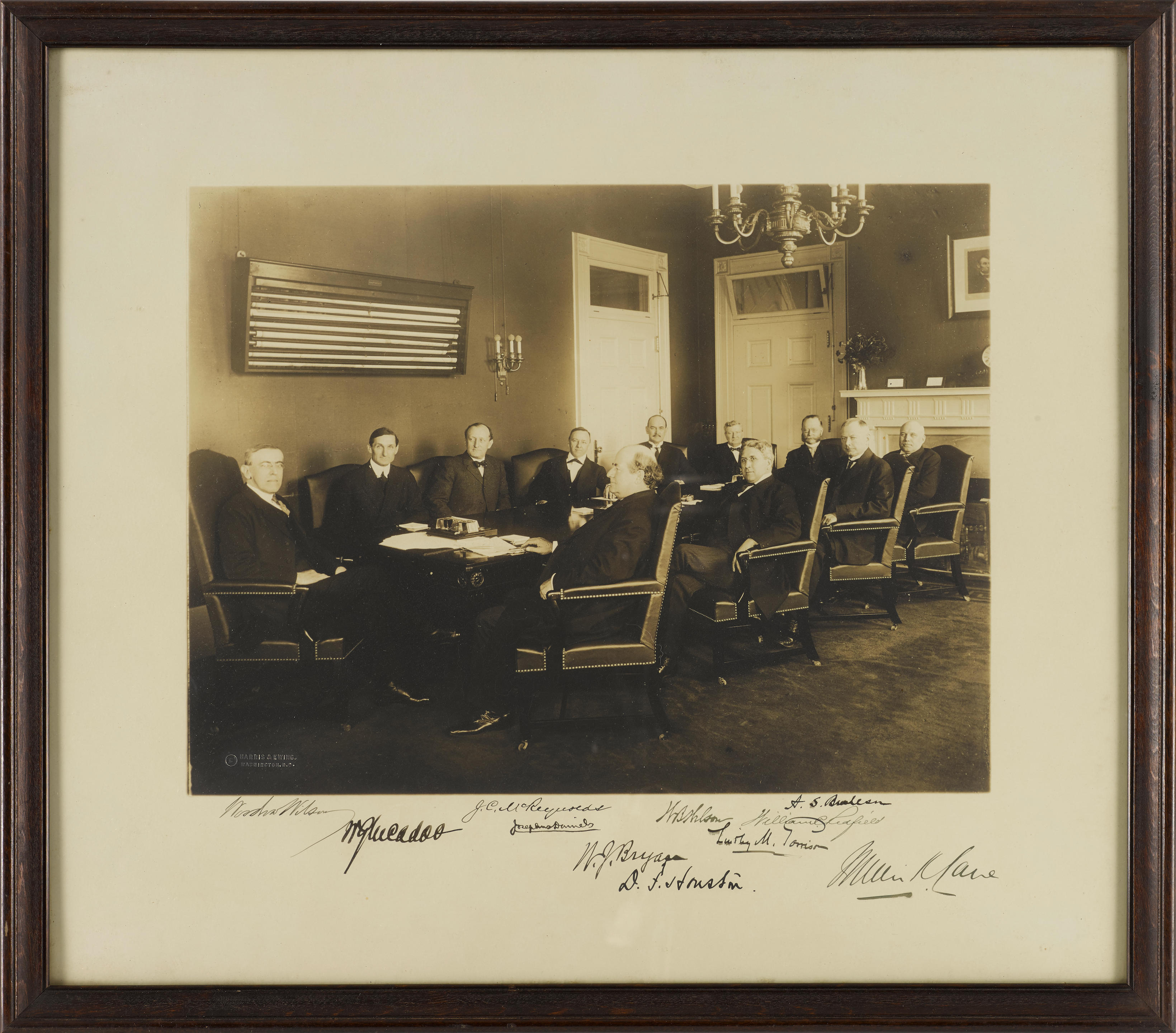WILSON, Woodrow. Photograph signed ("Woodrow Wilson"), as President, n.d. [ca. 1917] of Wilson delivering his War Message to a Joint Session of Congress on 2 April 1917. ALSO SIGNED BY VICE-PRESIDENT THOMAS R. MARSHALL AND SPEAKER OF THE HOUSE CHAMP CLARK. A Harris & Ewing, black and white photo, mounted on stock, 11½ x 13¾ . AMERICA GOES TO WAR. This striking Harris & Ewing photo captures the hushed drama in the House of Representatives as Wilson delivers his fateful request for a declaration of war against Germany. This is the moment at which the United States departed from its historic pattern of continental isolation and neutrality to become a major player in global affairs. Up until now -- protected from the ravages and machinations of European power politics by the vast buffer of the Atlantic Ocean -- the U. S. had adhered to Washington's (and Jefferson's) warnings about America embroiling itself in European affairs. But in the face of the brutal intransigence of both the Allied and Central Powers leaders, Wilson felt the U. S. had to intervene in order to shape the postwar settlement. In January 1918 Wilson declared his 14-point proposal maintaining peace: open diplomacy, free navigation of the seas, open commerce, and a world body for adjudicating international disputes -- the League of Nations. Wilson tragically failed. The vindictiveness of the "victors" thwarted him, as did his own people's unwillingness to break free of isolationism. But his commitment lived on, ultimately reaching fulfillment after a second world war, when America at last became the dominant force in international affairs that it remains today.
WILSON, Woodrow. Photograph signed ("Woodrow Wilson"), as President, n.d. [ca. 1917] of Wilson delivering his War Message to a Joint Session of Congress on 2 April 1917. ALSO SIGNED BY VICE-PRESIDENT THOMAS R. MARSHALL AND SPEAKER OF THE HOUSE CHAMP CLARK. A Harris & Ewing, black and white photo, mounted on stock, 11½ x 13¾ . AMERICA GOES TO WAR. This striking Harris & Ewing photo captures the hushed drama in the House of Representatives as Wilson delivers his fateful request for a declaration of war against Germany. This is the moment at which the United States departed from its historic pattern of continental isolation and neutrality to become a major player in global affairs. Up until now -- protected from the ravages and machinations of European power politics by the vast buffer of the Atlantic Ocean -- the U. S. had adhered to Washington's (and Jefferson's) warnings about America embroiling itself in European affairs. But in the face of the brutal intransigence of both the Allied and Central Powers leaders, Wilson felt the U. S. had to intervene in order to shape the postwar settlement. In January 1918 Wilson declared his 14-point proposal maintaining peace: open diplomacy, free navigation of the seas, open commerce, and a world body for adjudicating international disputes -- the League of Nations. Wilson tragically failed. The vindictiveness of the "victors" thwarted him, as did his own people's unwillingness to break free of isolationism. But his commitment lived on, ultimately reaching fulfillment after a second world war, when America at last became the dominant force in international affairs that it remains today.




.jpg?w=400?width=1600&quality=70)

.jpg)




.jpg)



Try LotSearch and its premium features for 7 days - without any costs!
Be notified automatically about new items in upcoming auctions.
Create an alert